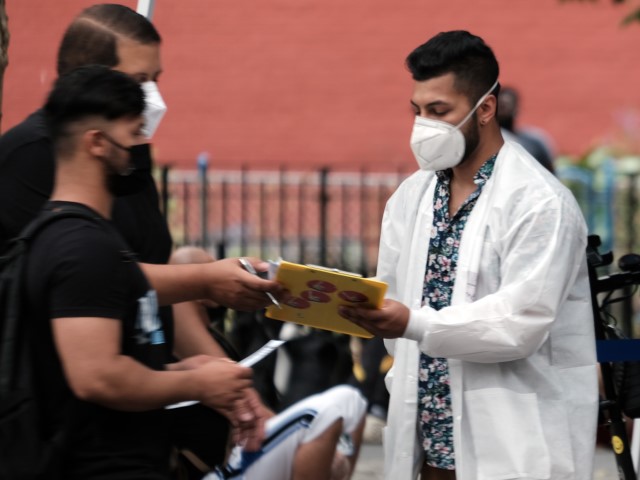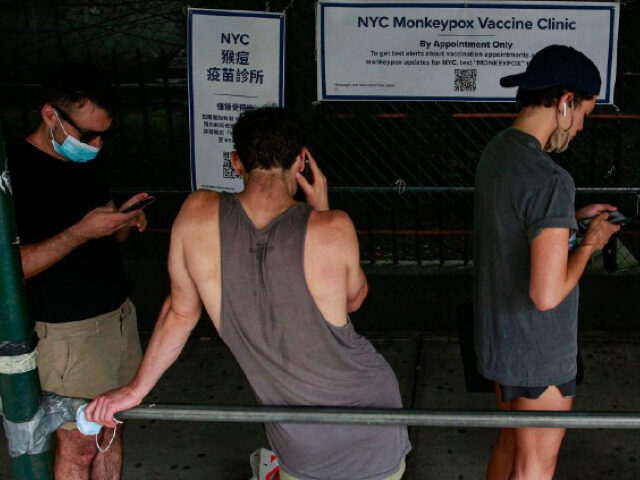The World Health Organization (W.H.O.) on Thursday declared a formal end to its monkeypox emergency due to rapidly declining case numbers around the world. The monkeypox crisis wound up lasting almost exactly one year.
W.H.O. Director-General Tedros Adhanom Ghebreyesus noted monkeypox is still a threat in parts of Africa as it has always been. Fears of a pandemic only began after a mysterious surge of cases in Europe and North America in May 2022.
“However, as with [Wuhan coronavirus], that does not mean that the work is over. While the emergencies of mpox and [Wuhan coronavirus] are both over, the threat of resurgent waves remains for both. Both viruses continue to circulate and both continue to kill,” Tedros said when announcing the end of the public health emergency of international concern (PHEIC).
W.H.O. declared a PHEIC in July 2022 after convening an emergency panel to study the unprecedented spike in European and American infections. Monkeypox, an unpleasant and sometimes disfiguring but rarely fatal disease, was previously almost unknown outside of Africa, where it is indeed spread by contact between monkeys and humans.
The Biden administration followed suit in August 2022 by declaring a public health emergency, a move that made more funding and personnel available to combat monkeypox.
“We’re prepared to take our response to the next level in addressing this virus, and we urge every American to take monkeypox seriously and to take responsibility to help us tackle this virus,” Health and Human Services Secretary Xavier Becerra said in August when announcing the emergency.
The burgeoning panic over monkeypox fizzled, and the disease became a political football when it became apparent the outbreak was largely due to homosexual men passing monkeypox to each other through intercourse. Infections also tended to be much more severe for people with untreated HIV.
Numerous political controversies broke out, including a push to rename the disease because calling it “monkeypox” was somehow insulting. As seen in the W.H.O. statement, the politically correct name is now “mpox.”
Some LGBTQ activists feared allowing monkeypox to become known as a “gay disease” would be demeaning, while others were angry at the Biden administration for concealing the true nature of the epidemic instead of warning gay people to take sensible precautions and making vaccines available to them.

Healthcare workers with New York City Department of Health and Mental Hygiene work at intake tents where individuals are registered to receive the monkeypox vaccine on July 29, 2022, in New York City. (Photo by Spencer Platt/Getty Images)
Cynical observers marveled that American and European officials who relished micromanaging the lives of citizens during the Wuhan coronavirus pandemic were suddenly reluctant to advise refraining from the behavior known to spread monkeypox. Gay Americans and Europeans figured it out on their own with impressive speed, demonstrating high levels of awareness in surveys taken just a few months after the outbreak began.
Infections began to decline sharply by the end of last summer. According to Tedros on Thursday, infections fell by 90 percent over the past three months, leaving W.H.O.’s tally from the outbreak at roughly 87,000 cases and 140 deaths in 111 countries.
“While stigma has been a driving concern in managing this epidemic and continues to hamper access to care for mpox, the feared backlash against the most affected communities has largely not materialized. For that, we are thankful,” the W.H.O. director said.
Monkeypox was all but forgotten by the public by the end of 2022, which some epidemiologists believe is a mistake because the disease spread widely enough to gain a lasting foothold in Europe and America.
African doctors also lamented the loss of international attention on a disease that remains a chronic problem on their continent. They especially feared that the end of W.H.O.’s PHEIC designation could reduce the resources available to control monkeypox outbreaks in Africa and devise new vaccines.
W.H.O. Emergencies Director Mike Ryan said he was “shocked” at how little international funding was dedicated to fighting monkeypox in Africa, musing that it might be “an issue of the continued prejudices that exist in the world.”
The Washington Post reported on Friday that monkeypox is making a bit of a comeback among gay and bisexual men, with clusters of cases reported in Chicago and France, although overall infection rates remain low.
Chicago has documented 14 cases over the past few weeks, 10 of them in people who were vaccinated. 80 percent of the patients were men who said they had sex with other men, and some of the remaining 20 percent did not reveal their sexual orientation.
The Jynneos vaccine against monkeypox is estimated to be 70 percent effective after two shots, but it remains unclear how long the protection lasts. Booster shots are currently not recommended by health officials.
“Last year’s mpox outbreak started in the spring, driven in part by festivals, pride events and other celebrations popular among gay men where attendees are traveling and having sex with new partners,” the Washington Post noted.
Flashback: CDC Director Walensky: We Don’t Have All the “Data That We Need” on Monkeypox, It’s Similar to What We Had with COVID

COMMENTS
Please let us know if you're having issues with commenting.